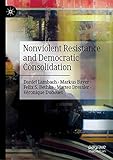Nonviolent resistance and democratic consolidation / Daniel Lambach [and four others]
Material type: TextPublisher: Cham : Palgrave Macmillan, 2020Description: 1 online resource (196 pages)Content type:
TextPublisher: Cham : Palgrave Macmillan, 2020Description: 1 online resource (196 pages)Content type: - text
- computer
- online resource
- 9783030393717
- 3030393712
- JC423 .L36 2020
| Item type | Current library | Shelving location | Call number | Status | Date due | Barcode | Item holds | |
|---|---|---|---|---|---|---|---|---|
 General Book
General Book
|
Kuakarun Nursing Library | Processing unit | JC423 L36 2020 (Browse shelf(Opens below)) | Available | 0000046106 |
Includes bibliographical references and index
Intro -- Preface -- Contents -- List of Figures -- 1 Introduction -- A Story of Three African Democracies -- Thinking About Nonviolence -- The Case for Democracy -- Research Design and Results -- Outline of the Book -- References -- 2 Theory -- Democratic Consolidation -- A Relational Approach to Political Regimes -- Critical Junctures, Path Dependence, and Modes of Transition -- Causal Assumptions and Mechanisms -- Levelling the Political Playing Field -- Advancing a Democratic Political Culture -- Avoiding the Praetorian Problem -- References -- 3 Statistical Analysis -- Research Design -- Measuring Resistance Campaigns and Democratic Transitions -- Alternative Explanations for Democratic Consolidation -- Estimation Procedures -- The Effect of NVR on Democratic Survival -- The Effect of NVR on Achieving Peaceful Turnovers of Power -- The Effect of NVR on Democratic Quality -- Discussion of the Results -- References -- 4 Mechanisms -- Democratization and Democratic Consolidation in Benin -- Democratization and Democratic Consolidation in Chile -- Levelling the Political Playing Field -- How NVR Levelled the Playing Field in Benin -- How NVR Levelled the Playing Field in Chile -- Concluding Summary of the Mechanism and Evidence from Other Cases -- Advancing a Democratic Civic Culture and Resistance as a Symbolic Reference Point -- The Development of Civic Culture in Benin After Transition -- The Development of Civic Culture in Chile After Transition -- Concluding Summary of the Mechanism and Evidence from Other Cases -- Avoiding the Praetorian Problem -- Civil-Military Relations in Benin -- Civil-Military Relations in Chile -- Concluding Summary of the Mechanism and Evidence from Other Cases -- General Remarks on Mechanisms and Case Studies -- References -- 5 Inching Towards Theory -- Summary of Findings -- Revisiting Our Assumptions -- Limitations of Our Results -- Comparing Our Results -- Towards a Theory of NVR and Democratic Consolidation -- References -- 6 Conclusion -- References -- Index
Available to OhioLINK libraries
This book argues that democracies emerging from peaceful protest last longer, achieve higher levels of democratic quality, and are more likely to see at least two peaceful handovers of power than democracies that emerged out of violent resistance or top-down liberalization. Nonviolent resistance is not just an effective means of deposing dictators; it can also help consolidate democracy after the transition from autocratic rule. Drawing on case studies on democratic consolidation in Africa and Latin America, the authors find that nonviolent resistance creates a more inclusive transition process that is more resistant to democratic breakdown in the long term
There are no comments on this title.

